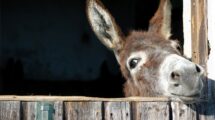Animal Chatter
by Iris Winston
A boxer that he named Mr. Bumble was my cousin Bill’s first dog. Then came other Mr. Bumbles, always boxers. He had loved his first pup so much that he attempted to recreate the first Mr. B over and over again after he had gone.

Of course, that’s impossible. Bill might have other boxers who looked exactly like the first. But every dog is an individual. So their temperaments would vary. They might also have different health issues.
Certainly, the general characteristics of dogs bred for specific purposes, such as hunting, herding or guarding, will be evident in purebreds of the particular breeds. But whether an animal is outgoing or shy, exuberant or quiet, more interested in food than toys or more or less anxious if separated from his person varies with each animal and may change in accordance with their lifetime experiences.
Various health issues are more likely to appear in certain breeds. For example, boxers, who are not generally particularly long-lived, are more likely to suffer from corneal ulcers than a number of other breeds. Large, long-legged dogs such as Great Danes tend to be prone to bone cancer. Some health issues, such as kidney problems, are more associated with age than with a specific breed of dog, although Dalmatians seem to have more urinary tract infections and kidney stones than other breeds. Meanwhile, other diseases, such as hip dysplasia, thyroid irregularities and certain hereditary cancers are genetically linked.
This is one of the reasons that many people speak of hybrid vigour suggesting that mixed breeds tend to be healthier and to live longer than purebred dogs. “Mutts” or random-bred dogs do have access to a much wider gene pool. But, as canine expert, author and psychologist Stanley Coren points out, they have an equal chance of doubling any problems through unsupervised and indiscriminate breeding as they do of halving the incidence of any inherited health issues.
 In general, he says, “the jury is still out on whether mixed-breed dogs are healthier overall. Thus far, the data suggests that mixed-breed dogs can inherit many of the problems associated with each of the breeds that goes into their makeup.”
In general, he says, “the jury is still out on whether mixed-breed dogs are healthier overall. Thus far, the data suggests that mixed-breed dogs can inherit many of the problems associated with each of the breeds that goes into their makeup.”
In looking at personality, some people argue that the more a mixed breed dog looks like one of his ancestors, the more likely he is to demonstrate behavioural characteristics associated with that part of his background. Other dog experts say that “distinctive physical traits are not highly correlated to inheritable behaviour traits.”
Geneticist Elinor Karlsson of the University of Massachusetts Chan Medical School says that the assumption that breed is predictive of behaviour in dogs is not accurate much of the time. A recent genetic study of 2,155 purebred and mixed breed dogs she and her team conducted, combined with 18,385 owner surveys, challenged existing views on dog breed stereotypes and personality traits. It noted that “although many physical traits were associated with breeds, behaviour was much more variable among individual dogs. Among behavioural traits, biddability—how well dogs respond to human direction—was the most heritable by breed but varied significantly among individual dogs.”
Therefore, the report noted, “dog breed is generally a poor predictor of individual behaviour and should not be used to inform decisions relating to the selection of a pet dog.”
The researchers emphasized that including mixed breed dogs in the study was important because “it shed light on how ancestry affects behaviour while removing purebred stereotypes that could affect the way the dog is treated—and therefore behaves.”

As Philadelphia-based dog trainer Curtis Kelly says, “Dogs are as individual as people. Breed gives a loose guideline for what kind of behaviours to expect, but it’s certainly not a hard-and-fast rule. Even within a litter, dogs can show very different personalities. Puppies will show you who they are at eight weeks old. It’s our job to believe them.”
Much of the time, it is the pup or adult dog who reaches out to you that makes the choice. And that can be the beginning of a perfect pairing for the rest of that canine’s life.
Almonte, Ontario, writer Iris Winston is a former executive director of the Canadian Federation of Humane Societies. She has been an animal lover all her life. Her pets have always been important members of her family.






